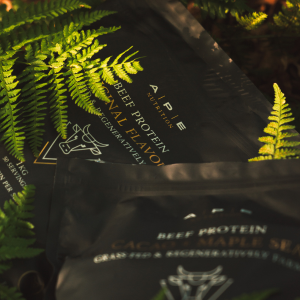Whether you’re male, female, three weeks post-partum or three years, understanding the nutritional needs of women post-partum is essential, because it can change the health of mothers and babies for the rest of their lives.
I became a mother almost 8 months ago at the time of writing this post, and being a nutrition and health coach, I naturally wanted to research and deeply understand how to feed my baby and myself as best as possible to ensure our health. What I found was intuitively obvious, but it also made it incredibly clear to me just how many mothers – and their babies – are likely lacking in essential nutrients at this vital time of life. It may feel difficult to prepare meals and think about what to eat when you’re sleep-deprived and figuring out how to look after a brand new human being, but even making the smallest efforts and having a little support around you can go a long way to nourishing mum and baby.
Why Is Post-Partum Nutrition Important?
Throughout pregnancy there’s a lot of focus on what expecting mothers should avoid, which can lead to low levels of important nutrients in itself. When baby arrives however, it’s absolutely vital to focus on what you need to include in your diet now. Whilst we’re pregnant, we’re ‘eating for two’ not necessarily in terms of the calories we need to consume, but in the nutritional density we need to eat. If we’re snacking on processed foods or ‘empty calories’, we can very quickly become depleted in nutrients. Even the amount of sunlight we get during pregnancy can impact how we feel after pregnancy, with low vitamin D levels correlating to increased risk of postpartum depression.
Post-partum depletion is actually quite common, with research showing up to 50% of mothers experience some form of nutritional depletion which can last for up to 10 years after giving birth.[1] This form of depletion includes a combination of physical, hormonal and emotional depletion that a mother can experience after giving birth. If a mother is breast feeding, her baby is literally pulling nutrients from her body, so in order to give her baby the necessary vitamins and minerals to thrive, she needs to consume them herself. If she doesn’t baby will either pull these nutrients from her – leading to even further depletion and deficiencies – or baby may not be able to receive some important nutrients at all, preventing optimal development. This is one of the reasons why traditional cultures advised proper spacing of births; to give time for the mother to replenish her nutrient stores before growing another life again.
If a mother is breastfeeding, the first three months of her baby’s life are also vital in terms of what baby is consuming. Specific nutrients such as iodine and choline directly support brain development, whilst iron supplies baby with building blocks for proper thyroid function, and B12 the nutrients for optimal red blood cell development, energy production and DNA formation. Babies with low B12 can be more irritable and even have an increased risk of failure to thrive. As you can probably tell by now, all of this points to how absolutely essential is it to consume a nutrient-dense diet with plenty of high-quality animal products as our ancestors would have prioritised.
Ancestral Post-Partum Nutrition
Within many traditional cultures, the first 40-or-so days after giving birth are considered a sacred time for mother and baby. Within Traditional Chinese Medicine (TCM) this period is known as the ‘Golden Month’, where mothers are encouraged to stay at home and rest, and consume plenty of warming, nourishing foods such as meaty stews, broths and congee. Protein plays a central role, with mothers sometimes being encouraged to eat up to 10 eggs per day! Ayurvedic texts from India dating back thousands of years even say; “A new mother should be treated with massage, warm baths, a specific diet and herbal drinks that prevent infection, promote vitality and alleviate vata” (Vata is a type of energy that can make us feel cold, dry, anxious and depleted). [2]
The Weston A Price foundation – a community focusing on nourishing traditional wisdom and nutrition through the work of Weston A Price – prioritises mother and baby wellbeing by encouraging the consumption of nutrient-dense foods such as; ‘organ meats and pastured meats from local sources (filled with iron, selenium and the B vitamins); eggs rich in choline, fatty acids and vitamin D; wild-caught seafood containing iodine and zinc; grass-fed butter with the famous X factor (vitamin K2); natural cod liver oil for vitamin A; cultured dairy and raw milk (with many immune-boosting molecules and friendly gut bacteria); and warm and fragrant bone broths, soups and stews that can be easily consumed throughout the day’. [3] Raw milk in particular is a wonderful way to boost breast milk and provides valuable fats and vitamins.
My Own Post-Partum Journey
When my baby arrived, I was lucky enough to have plenty of family support around me, and my own mum had already prepared litres of bone broth and frozen meals of grass-fed beef and soups (top tip for any expecting mothers: prepare meals in advance and ask people to help out! It’ll make the next few weeks that little bit easier). If you’ve ever heard the phrase ‘it takes a village to raise a child’, I really think this is true. A mother’s priority in the first few weeks and months needs to be simply feeding and caring for her baby, and if people around her can prepare foods, give her healthy snacks and keep her hydrated, they’ll be directly contributing to growing a healthy child.
In the first few weeks – my main foods included slow-cooked stews with meat and grounding root vegetables (my baby was born in January, so we were still eating Winter foods), warmed raw milk, bone broth and meat stock, homemade gelatine gummies, and plenty of fats from coconut oil, avocado, ghee, butter and raw cream. I used MCT oil in my morning cup of warmed milk to help boost my brain power too, but also to increase the beneficial fatty acids in my breast milk. Research shows that an increase in fatty acids from a mother’s diet can contribute to increased fats in breast milk,[4] which makes the milk more satisfying and satiating, often leading to a more content baby. My baby slept through the night from 6 weeks old, and I really do put it down to this increase in nutrient-dense foods and fats. I also included herbs like fennel and fenugreek in herbal teas to support breast milk production, as well as small amounts of natural ‘galactagogues’ for breast milk support too, such as properly prepared oats soaked in raw milk, although if you choose to avoid grains completely, there’s no need to consume them.
The foods I chose to avoid for a while included fermented foods (this can make babies a little gassy if you’re breast feeding, which makes them uncomfortable and unsettled), strong spices and stimulants such as coffee and even cacao, as the stimulating properties can pass directly into breast milk and disturb sleep patterns. I still avoid caffeine now, as well as alcohol.
Protein was – and still is – high on my post-partum priority list, to aid healing for myself, but to also support my little one. Eggs, meat, poultry, fish, dairy, as well as supplementing with daily collagen and immune-supporting colostrum are all a regular part of my diet. When I work with other women who want support with fertility, pregnancy or post-partum, protein is often one of the first things we focus on, especially with regard to nutrient-dense sources. A 20-30g serving of protein at each meal (especially breakfast) can make a huge difference to hormone health to support every stage of baby-making and baby-caring, and is worth trying.
Top 10 Post-Partum Foods and Nutrients
Here are my top post-partum nutrients and food sources for mother and baby health. If you aren’t able to obtain high quality organ meats, I highly suggest supplementing with the Grass Fed Beef Organs or Grass Fed Beef Liver to support your nutritional needs at this time.
1. Organ meats: Traditional cultures prized organ meats for fertility and post-partum, especially liver. They’re high in essential micronutrients that help with mum’s recovery, as well as baby’s development. Heart, kidney, liver, brain and pretty much any other type of organ meat you can buy from your local organic farm or butcher can be a valuable source of nutrients.
2. Grass Fed meat: B vitamins from meat are important for energy production, red blood cell formation, and supporting muscle and tissue healing. Meat of course also contains iron, which is needed after giving birth to replenish stores, as well as to support baby if you’re breast feeding. Try to find grass fed, local cuts of meat.
3. Healthy Fats: As I mentioned, these can really support breast milk, as well as giving mum essential energy for her brain and body. Choose animal fats like lard, tallow and ghee, as well as coconut oil, avocado and high-quality olive oil.
4. Iodine: This mineral is vital for thyroid function for both mum and baby. It can be common for thyroid issues to occur during and after pregnancy due to hormonal fluctuations, so focusing on this nutrient is more important now than even. Iodine also supports baby’s thyroid too, as well as neurological development. You’ll find it in dairy (especially raw milk), sea weed and seafood such as oysters.
5. Choline: A little-known nutrient, but one that is becoming more talked-about now. Choline helps cognitive development, especially if consumed during pregnancy too. One of the best sources is egg yolks, and when baby starts eating solids, egg yolks are a true baby superfood! Other top sources include meat, poultry fish and dairy.
6. Iron: As I mentioned, obtaining iron from meat is important for supporting both mum and baby. In combination with B9 and B12, it can help prevent anaemia and low energy levels. The best sources are red meat and liver in particular.
7. Vitamin D: Deficiencies in this nutrient are extremely common, but does taking a vitamin D supplement really help? There’s so much conversation around whether supplementing with synthetic vitamin D is truly beneficial or not, but if you can focus on natural forms of vitamin D, this can go a long way to supporting you and baby. Sunlight is by far the best way to get natural vitamin D, and there are many texts produced around 100 years ago explaining how to give babies ‘sun baths’ for their vitamin D levels. Food sources include oily fish, red meat, dairy – especially colostrum – and egg yolks.
8. Bone broth and meat stock: These time-honoured healing foods provide amino acids to heal and nourish the body, as well as benefitting gut health. Bone broth and meat stock also contain glycine, which can improve mood, aid sleep, and improve the health of hair, skin and nails, and protects against intestinal disorders. [5] The books Nourishing Traditions and Nourishing Broth by Sally Fallon are wonderful resources for making your own healing broths and soups.
9. Milk-boosting herbs: Specific herbs and spices known as ‘galactagogues’ can help increase breast milk production. Fennel and fenugreek are two of the most well-known herbs to help with this, and can be found in many lactation teas.
10. A non-nutritional tip – reduce stress: Having a new baby can be an emotionally challenging time for the entire family, and modern life often means we’re trying to take on way more than we ‘should’ way earlier than is necessary. Try to make the home a relaxing, nourishing, quiet space. Only invite over people you actually want to see, and allow everyone to help you. Forget about cleaning and ‘getting stuff done’ right now, it’s your baby that needs you most. Babies are incredibly aware and can sense a stressful environment. Stress can also impact the hormones involved with breast milk production, so do what you can to cultivate calmness in yourself and your home.
I hope these insights benefit yourself and your baby in this precious time.
[1] https://kinfertility.com.au/blog/postnatal-depletion
[2] [3] https://www.westonaprice.org/health-topics/womens-health/nourishing-the-new-mother-the-lost-art-of-postpartum-care/#gsc.tab=0
[4} https://internationalbreastfeedingjournal.biomedcentral.com/articles/10.1186/1746-
4358-5-3#:~:text=Increased%20dietary%20intake%20of%20stearic,%3C%200.05)%20in%204%20da
ys.
[5] https://www.ncbi.nlm.nih.gov/pmc/articles/PMC5350494/






